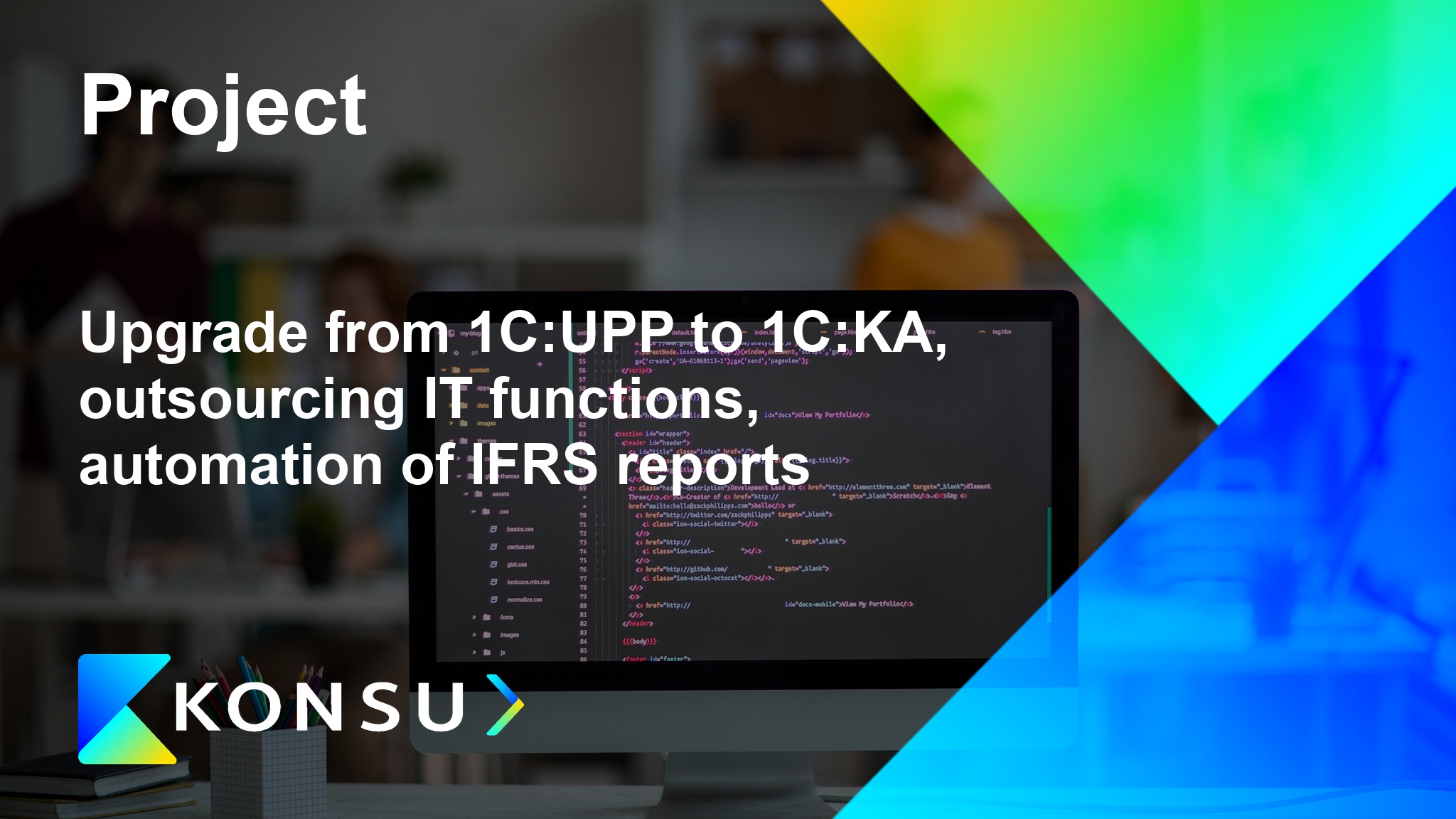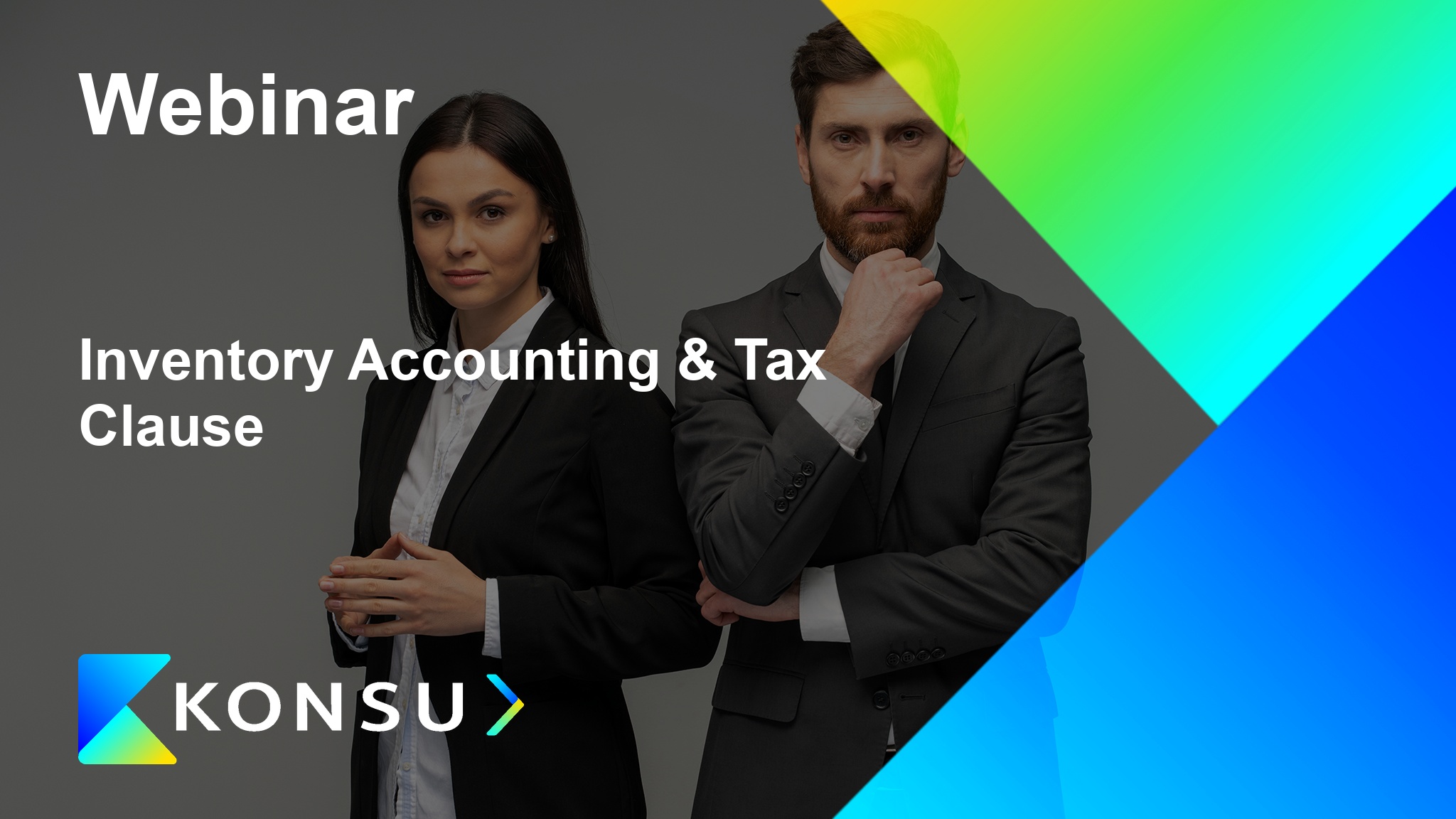Migration from 1C:UPP to 1C:CA, subsequent 1C support
Client
Activity: supply of products for fast food outlets, rental of equipment for fast food preparation.
Previously used systems: 1C:UPP.
Customer volumes: 100 employees, more than 8,000 documents per month.
Objectives
- Migration to the current 1C:CA product from 1C:UPP and setting up integration with 1C Document Management, EDI Contour, 1C:ZUP, customer order processing system, warehouse system of the logistics partner;
- Waiver of internal IT service;
- Automate IFRS report generation;
- Further support of the client's 1C products. Gathering business requirements, development, testing, implementation of 1C enhancements.

Project stages
- Developed a wizard for transferring balances and actual directories from 1C:UPP to 1C:CA;
- Analyzed client processes in 1C:UPP, agreed and implemented improvements in 1C:CA, including IFRS report;
- Reconfigured and automated integrations with 1C Document Management, 1C:ZUP, as well as exchanges with EDI, EDM and client portals;
- Two-way exchange between 1C:CA and the internal warehouse system of the logistics partner.
Results:
- All client’s operations since the beginning of the year were migrated to the current 1C:CA product without the need to stop daily operational activities of the client;
- Monthly 1C support services are provided through the ticketing tool system, which eliminated the need to maintain an internal IT service;
- The IFRS report was automated.
Accounting policies
Contents
What are accounting policies and why are they necessary?
Accounting policies are internal documents of an organization that outline the procedures for reflecting accounting and tax operations. They are created specifically for the company or group of companies in which they will be used, taking into account the peculiarities of their operations. Therefore, there is no universal template for accounting policies.
If there are no government standards for a particular accounting issue, the organization develops and outlines them in its accounting policies.
If an organization prepares financial statements in accordance with IFRS (consolidated or individual financial statements of an organization not forming a group), it is allowed to use federal accounting standards when developing the accounting policies, taking into account the requirements of IFRS. Specifically, it is allowed to deviate from the accounting method established by federal standards if this method results in the organization's accounting policies being inconsistent with the requirements of IFRS.
Branches and representative offices of foreign organizations located in the territory of the Russian Federation may develop their accounting policies based on the rules established in the country of the foreign organization, if they do not contradict the International Financial Reporting Standards (IFRS).
If the organization does not apply the method of accounting (MA) established by the federal accounting standards (in case of its non-compliance with IFRS), it is necessary to describe this method, as well as to disclose the corresponding requirements of IFRS and describe how this requirement will be violated in case of application of the MA established by the federal standard.
Essentially, accounting policies are practical instructions designed to ensure that the accounting and tax accounting of the company are carried out according to a single standard, and all employees are required to strictly adhere to the approved rules.
If a tax audit occurs, the inspector will verify compliance with the accounting policies adopted in the organization for the accounting and tax accounting. For example, if some economic or tax operations used by the company are not reflected in the text, the tax inspector during the audit may apply a different calculation method. As a result, the amount of tax deductions may not match - the organization may be required to pay additional taxes or receive a fine.
Thus, accounting policies are a necessary tool for proper accounting and tax accounting and for compliance with legal requirements.
Requirements of the legislation for the content of accounting policies
An organization independently develops its accounting policy for accounting purposes, but must comply with a number of mandatory requirements. These requirements are established, including in the Regulation on Accounting Policy of the Organization (PBU 1/2008), approved by the order of the Ministry of Finance of the Russian Federation No. 106n dated 06.10.2008.
The accounting policy of the organization is developed by the person responsible for accounting in accordance with the legislation of the Russian Federation, and is approved by the organization's management with appropriate organizational and administrative documentation (order, directive, etc.).
The adopted accounting policy must meet the following requirements:
- completeness;
- timeliness;
- prudence;
- content priority
- over form;
- consistency;
- rationality.
The accounting policy is applied from the first of January of the year following the year of approval of the corresponding organizational and administrative document. At the same time, it is applied to all branches, representative offices, and other subdivisions of the organization (including those allocated to a separate balance sheet), regardless of their location.
In relation to the accounting of a specific object of accounting, one of the methods of accounting allowed by federal standards is chosen.
If the method of accounting for a particular object is not established by federal accounting standards, then the organization has the right to develop and approve it independently (part 4, article 8 of the Federal Law of December 06, 2011, No. 402-FZ "On Accounting"). At the same time, the organization uses the following documents sequentially:
- International Financial Reporting Standards;
- Provisions of federal and/or industry-specific accounting standards on similar and/or related issues;
- Recommendations in the field of accounting.
As a general rule, the organization selects the methods of accounting independently of all other organizations. However, if the head organization approves its own accounting standards, which are mandatory for its subsidiaries to apply, then the subsidiary companies must choose the methods of accounting exclusively based on the organization's approved standards (clause 5.1 of the Ministry of Finance Order dated October 6, 2008 No. 106n).
In turn, organizations that apply simplified accounting methods, in the absence of corresponding accounting methods on a specific issue in the Federal Accounting Standards, have the right to form an accounting policy based solely on the requirement of rationality.
The accounting policy of each organization must necessarily contain the following elements (clause 4 of the Ministry of Finance Order dated October 6, 2008 No. 106n):
- a working chart of accounts. This chart must include synthetic and analytical accounts necessary for accounting in accordance with the requirements of timely and complete accounting and reporting;
- forms of primary accounting documents, accounting registers, and documents for internal accounting reporting;
- specific methods of evaluating the organization's assets and liabilities;
- the procedure for conducting inventory;
- rules of document flow and control over all business transactions.
Changes in accounting policies may be made in the following cases:
- Changes in the legislation of the Russian Federation and/or regulatory legal acts on accounting;
- Changes in the methods of accounting, in cases where the organization has decided to use methods of accounting different from those previously applied;
- Changes in the organizational and legal form, changes in the type of activity.
Changes in the accounting policy are also formalized by an organizational and administrative document and, as a rule, are made from the beginning of the reporting year, unless otherwise provided by the reason for such a change.
If there are facts of business activity in the organization that differ from those that existed previously, the approval of the methods of accounting for such facts in the accounting policy is not considered a change.
The consequences of changes in the accounting policy are reflected retrospectively and prospectively.
Retrospective reflection means the application of changed accounting methods from the moment of the occurrence of facts of economic activity of this type and consists in adjusting the opening balance on the "Retained earnings (accumulated deficit)" account and other items of the balance sheet to the earliest date presented in the accounting (financial) statements, as well as values of related items of the financial statements. The prospective approach means adjusting performance indicators at the beginning or during the year in which new accounting methods are introduced.
The consequences of changes in accounting policy caused by paragraph (a) are reflected in accounting and reporting in the manner established by the corresponding legislation and/or regulatory act. If these documents do not establish the order of reflecting the consequences, then the consequences of changes in accounting are reflected retrospectively.
The consequences of changes in accounting policy caused by paragraphs (b) and (c) are reflected in accounting and reporting retrospectively.
An organization can prospectively reflect changes in accounting policy in the following cases:
- when the assessment of the monetary effects of changes in accounting policy for periods preceding the reporting period cannot be made with sufficient accuracy;
- when the consequences of changes in accounting policy have not had and are not capable of having a significant impact on the financial position of the organization, the financial results of its activities, and cash flows;
- in cases where it is entitled to use simplified methods of accounting, except for cases where a different procedure is established by Russian legislation and/or other regulatory acts on accounting.
If any of the recently adopted FASB standards are applied early by the organization, the corresponding changes must be included in the accounting policy for the current year.
One should not forget about the formation of accounting policy for tax purposes. The Tax Code allows taxpayers to choose the method of determining income and expenses, the method of depreciation, the procedure for making advance payments, forming reserves, the procedure for allocating VAT on expenses in the implementation of taxable and non-taxable VAT operations, etc. The chosen methods, as well as the tax accounting registers, must be fixed in the accounting policy for tax purposes, approved by the order of the head of the organization.
What should be reflected in the accounting policy in connection with the introduction of new Federal Accounting Standards (FAS 5/2019 "Inventories", FAS 6/2020 "Fixed Assets", FAS 26/2020 "Capital Investments", FAS 25/2018 "Accounting for Leases", FAS 27/2021 "Documents and Document Flow in Accounting").
Starting from 2021 and 2022, five new FASs are mandatory:
Starting from 2021: FAS 5/2019 "Inventories"
Starting from 2022:
- FAS 6/2020 "Fixed Assets" - not applicable to capital investments and long-term assets held for sale;
- FAS 26/2020 "Capital Investments";
- FAS 25/2018 "Accounting for Leases";
- FAS 27/2021 "Documents and Document Flow in Accounting".
Organizations need to make changes to their accounting policy for 2021 and 2022 in accordance with the requirements of the new accounting standards.
When making a decision to edit the accounting policy, it is necessary to check how applicable the new FASs are to the organization.
Changes to the accounting policy for 2021
In connection with the introduction of FAS 5/2019 "Inventories" in 2021, organizations need to make the following changes to their accounting policy for 2021:
- Remove references to all regulatory acts that have ceased to be effective in connection with the introduction of FAS 5/2019.
- Determine the composition of inventories in accordance with paragraph 3 of FAS 5/2019.
- Specify the order of applying FAS 5/2019 - retrospectively or prospectively.
- Determine the unit of measurement for inventories based on paragraph 6 of FAS 5/2019.
- Determine the procedure for accounting for inventories intended for management purposes as expenses of the current period or in the general manner in accordance with the rules of FAS 5/2019.
- Determine where the costs of procurement and delivery of goods to central warehouses will be recorded, either in the cost of goods sold or as part of selling expenses.
- Specify the procedure for accounting for low-value fixed assets and special clothing.
- Establish the procedure for assessing inventories upon their disposal (at the weighted average cost, by the FIFO method, or by the cost of each unit).
- Establish the procedure for calculating a provision for the impairment of inventories.
Changes to the accounting policy for 2022
FAS 6/2020 "Fixed Assets"
In the accounting policy for 2022, it is necessary to specify (paragraphs 5, 10, 11, 13, 17, 20, 33, 34, 35, 48, 49 of FAS 6/2020 "Fixed Assets", approved by the Order of the Ministry of Finance of September 17, 2020 No. 204n):
- the method of transition to the new standard (retrospectively or with a one-time adjustment of the balance sheet value at the beginning of the reporting period);
- which groups of fixed assets the organization will allocate;
- principles for forming groups of fixed assets - a combination of fixed assets of the same type, combined based on their similar use (paragraph 2 of paragraph 11 of FAS 6/2020);
- what limit of the value of fixed assets will be used (or if no limit will be set);
- the procedure for accounting for assets whose value is below the established limit;
- criteria for recognizing a portion of an asset as a separate fixed asset in the event of significant differences in the value and useful life of such an asset from the main fixed asset;
- the method of starting and ending depreciation (from the date of recognition of the asset or from the first day of the month to the first day of the month). If the fixed asset is depreciated from the date of recognition, a formula for calculating depreciation for the first (partial) month should also be determined;
- the method of depreciation for each group of fixed asset objects (straight-line, declining balance, proportional to the quantity of output produced). If the declining balance method is chosen, a formula for calculating the amount of depreciation should be fixed;
- the method of valuation for each group of fixed assets (based on the initial cost or revaluation) and the frequency of revaluation;
- the frequency and timing of impairment testing of fixed assets;
- the method of accounting for the consequences of fixed asset revaluation (adjustment of residual or initial value and depreciation);
- the method of writing off accumulated revaluation of fixed asset objects (at once upon disposal of the fixed asset or as depreciation is charged);
- the procedure for determining the liquidation value of fixed assets;
- the method of accounting for fixed assets during liquidation;
- the method of evaluating investment real estate, as well as the method of reflecting investment real estate in the balance sheet.
Organizations that have the right to use simplified accounting in accordance with the Law "On Accounting" No. 402-FZ of December 6, 2011, must establish in their accounting policies the relaxations provided by FAS for such organizations:
- Form the initial cost of fixed assets in a simplified manner;
- Do not check fixed assets and capital investments for impairment (paragraph 3 of FAS 6/2020 and paragraph 4 of FAS 26/2020);
- Do not include changes in valuation liabilities for dismantling in the initial cost of fixed assets, even if such valuation liabilities have been recognized;
- Reflect the transition to FAS 6/2020 prospectively.
FAS 26/2020 "Capital Investments"
It is important to specify in the accounting policy:
- The method of transition to the new standard. This can be a retrospective method (as if the standard had been applied to all capital investments before) or a prospective method (application of FAS to capital investments made after January 1, 2022) (paragraphs 25 and 26 of FAS 26/2020 "Capital Investments", approved by Order of the Ministry of Finance dated September 17, 2020, No. 204n);
- The procedure for calculating the cost of capital investments if deferred payment is provided for a period of at least 12 months;
- The frequency and timing of impairment testing for capital investments.
FAS 25/2018 "Accounting for Leases"
Organizations are required to establish the following provisions in their accounting policies for 2022 (clauses 11, 12, 15, 42, 47, 49-51 FAS 25/2018 "Accounting for Leases", approved by the Ministry of Finance on 16.10.2018 No. 208n):
- whether the organization will apply the standard to lease agreements that expire before the end of 2022;
- which approach will be used in connection with the transition to FAS 25/2018 (simplified or retrospective);
- which groups of lease items the lessee will identify;
- whether lease items with a fair value of no more than RUB 300,000 will be recognized as the lessee's right to use an asset;
- whether the lessee will recognize the right to use an asset for lease items with a fair value of more than RUB 300,000 and a lease term of no more than 12 months;
- how often lease payments will be recognized if the lessee does not recognize the lease item as the right to use an asset;
- the date on which the lessee accrues interest for the calculation of lease obligations;
- the procedure for determining the discount rate;
- how often operating lease income is recognized by the lessor (monthly, quarterly, etc.);
- the accounts in which the right to use assets is reflected and how information on the right to use assets is disclosed in the lessee's balance sheet.
Organizations that have the right to simplified accounting in accordance with the Law "On Accounting" No. 402-FZ of December 6, 2011, also have some concessions when accounting for lease obligations. Therefore, they need to additionally reflect in their accounting policy (paragraphs 13, 14, 51 of FAS 25/2018):
- Whether they will apply the new FAS to lease agreements whose performance began before December 31, 2021;
- Whether the leased items are recognized as a right to use an asset when fulfilling the conditions of paragraphs 11 and 12 of FAS 25/2018;
- How to calculate the actual cost of the right to use an asset (according to general rules or only in the sum of lease obligations);
- How to evaluate the lease obligation (in the general order or in the amount of the nominal values of future lease payments on the valuation date);
- How the lessor will account for any lease (with some exceptions listed in FAS) - as operating lease or according to the general rules of the standard.
FAS 27/2021 "Documents and Document Management in Accounting"
In connection with the introduction of FAS 27/2021 "Documents and Document Management in Accounting", approved by the Order of the Ministry of Finance No. 62n of April 16, 2021, organizations must include the following in their accounting policy:
- The fact of transition to FAS 27/2021;
- The procedure for correcting primary accounting documents and accounting registers compiled on paper (by correction or by means of an explanatory note in the accounting records) (paragraphs 18-22 of FAS 27/2021);
- The storage period of primary documents and accounting registers, which is now 5 years.
Please note that in case an organization has a accumulated tax loss, the storage period of primary documents and registers will be extended.
Practical aspects of applying accounting policies
An organization independently determines the main elements of its accounting policy, for which different accounting options are provided by current legislation, and an incorrect choice of such options leads to risks in accounting and tax accounting. Next, we will consider several of the most common examples of such risks.
Relevance of accounting methods
In 2021-2022, new Federal Accounting Standards (FAS) regulating the accounting of inventories, fixed assets, capital investments, and leases became mandatory for application. Each of them partially changes the established methods of evaluation and reflection of economic operations. If the accounting policy of enterprises is developed without taking into account FAS 5/2019 "Inventories", FAS 6/2020 "Fixed Assets" FAS 26/2020 "Capital Investments" and FAS 25/2018 "Accounting for Leases" this can lead to incorrect reflection of economic operations and distortion of financial reporting.
Method of Depreciation Calculation
Through accounting policies, an organization can influence the procedure for recognizing expenses related to the acquisition of depreciable assets. Since distorting the depreciation calculation can lead to the recognition of unreliable financial statements, it is important to correctly determine:
- The objects of accounting for fixed assets (including cost criteria for recognition);
- The start and end dates of depreciation;
- Useful life periods;
- The salvage value of fixed assets;
- The methods of calculating depreciation;
- The order of accounting for accrued depreciation.
Depreciation charges reduce the profit earned, so it is necessary to develop a depreciation policy that allows for the possibility of obtaining the maximum profit.
Methods for evaluating material production reserves
In accordance with paragraph 36 of the Russian Accounting Standards 5/2019, released and depleted reserves are evaluated using one of the following methods:
- by the cost of each unit;
- by the average cost;
- by the cost of the first units received (FIFO method).
For tax accounting purposes, the following methods of evaluating material production reserves may be used by the organization when they are depleted:
- the method of evaluating the cost of each unit of the reserves;
- the method of evaluating the average cost;
- the method of evaluating the cost of the first acquisitions (FIFO method).
Changes in the value of remaining materials affect the amount of current assets on the balance sheet and all indicators calculated on their basis. The use of different methods of evaluating material production reserves gives the organization the ability to achieve both minimum and maximum evaluations of material production reserves and to influence the impact of their write-off on the financial result.
Compiling tax accounting policies
When preparing tax accounting policies, one should follow the rules:
- From several options allowed by Chapter 25 of the Tax Code of the Russian Federation (Profit Tax of Organizations), choose the most suitable method for accounting for assets or economic operations.
- Specify accounting options only for operations that the organization performs or plans to perform.
- If the methodology for applying a particular method is not specified in tax legislation, it can be:
- borrowed from financial accounting;
- developed independently.
Develop independent tax accounting registers if the financial accounting registers do not provide sufficient information to determine the tax base.
A well-designed accounting policy allows solving several tasks at once:
- Improving the financial condition of the organization - choosing the most suitable accounting methodology that corresponds to the current type of organization's activity;
- Determining the optimal tax burden - choosing the most suitable accounting methods for tax purposes;
- Reducing labor costs in the organization - efficient organization of document flow (forms, deadlines, methods of transmission), storage of primary documents (use of electronic archives), application of optimal accounting methods;
- Reducing the risk of disputes with supervisory authorities - a detailed procedure for determining methods of accounting complicates the ability of auditors to challenge the legitimacy of their application;
- Reducing the risk of receiving a modified, conditionally positive, or negative audit opinion - an accounting policy that is complete, up-to-date, and consistent with the organization's actual accounting will help form a positive opinion of auditors;
- Ensuring a high level of the organization's internal control system - an accounting policy that provides for the timing and algorithm of inventory of assets and liabilities, as well as describing the procedure for controlling economic operations, can become an element of effective management.
Upgrade from 1C:UPP to 1C:KA, outsourcing IT functions, automation of IFRS reports
Client
- Supplying fast food outlets
- Accounting in 1C:UPP (1C:management of production companies)
- 100 employees
- More than 8000 documents per month
Objective
- Upgrade 1C software from 1С КА to 1С:UPP
- Integration with 1C:Document management, Kontur EDI, 1С:ZUP (1C payroll and HR acccounting system), client order processing system, IT systems of storage partners
- Outsourcing IT administration
- Automation of IFRS reporting
Requirements:
- Upgrade had to be performed without disruption of services and operating activities of the client

Implementation stages
- Development of scripts for transfer of directories and balances from 1C:UPP into 1C:KA
- Analysis of client processes in 1C:UPP. Adaptation of all custom modules for the new version of 1C software including IFRS modules
- Adjustment and automation of all integrations: 1C:Document management, 1C: Payroll&HR, EDM, EDI and other client services
- Daily support through ticketing tool, which allows client to optimize costs for IT administration
Upgrade from 1C:Enterprise to 1С:Comprehensive Automation. Change of 1C version, update of integrations, adjustment of IFRS modules
Client
- Wholesale company
- Accounting in 1C:Management of production companies
- Over 100 users

Implementation stages
- Analysis of business processes;
- Formulation of requirements;
- Development of more than 200 automations including integration with Internet portals of buyers and a warehouse contractor;
- The transition is implemented with balances from January 01, as well as with the transfer of outstanding orders according to the documents.
Inventory Accounting | Tax Clause
You can watch the webinar recording on YouTube and download presentations (in Russian).Read more
Corporate and annual financial statements by foreign companies operating in Russia
When foreign companies operating in Russia prepare their annual financial statements, they often have a tough time ensuring that internal corporate reports prepared according to International Financial Reporting Standards (IFRS) match those prepared according to Russian Accounting Standards (RAS). Depending on business operations, this problem may be resolved by either applying the accruals method or using BRIDGE Report.
Read more
Audit in Russia: FAQ
Which companies are subject to mandatory audits?
- All joint-stock companies (AO);
- Corporations with trading stock;
- Financial institutions;
- Business entities, including limited liability companies, with total sales of preceding year exceeding 400 million rubles or total assets exceeding 60 million rubles at the beginning of the reporting year;
- Entities issuing consolidated financial statements are also subject to mandatory audits.
Voluntary audits versus mandatory audits
Companies not subject to mandatory audits may, of course, request that their financial statements be voluntarily audited.
Is there any difference between voluntary and mandatory audits?
There is no difference, and both voluntary and mandatory audits must be conducted in compliance with audit regulations.
So if you need an independent auditor’s report for a bank or investor, we recommend conducting a voluntary audit.
If you would like to make sure that you do not need to conduct an audit, you could request a tax compliance examination.
Do audits verify tax compliance?
Although this is not the main focus of an audit, auditors generally verify tax compliance when they review financial statements which are what matter most!
When should statutory audits be conducted?
Audit reports are to be submitted to Russian statistical authorities together with financial reporting within 10 days of the date of audit report and no later than December 31st of the year following the reporting year. This means that for the financial year 2016, Russian statutory audit should be completed by December 31, 2017 at the latest.
How can Konsu help?
We are pleased to offer you our auditing services which provide the following benefits.
Konsu is an officially licensed auditor providing high quality audit reporting in accordance with Russian and international audit standards.
We offer phased audits conducted at specified intervals throughout the year, so that your company can rectify identified errors within the current reporting period and present better results upon final audit.
In addition to following formal, compulsory auditing procedures, our auditors and experts also provide the shareholders and management of an audited company with valid information about internal control issues, risk management, and efficiency of business processes.
If you have any other questions regarding audit in Russia please contact us.






